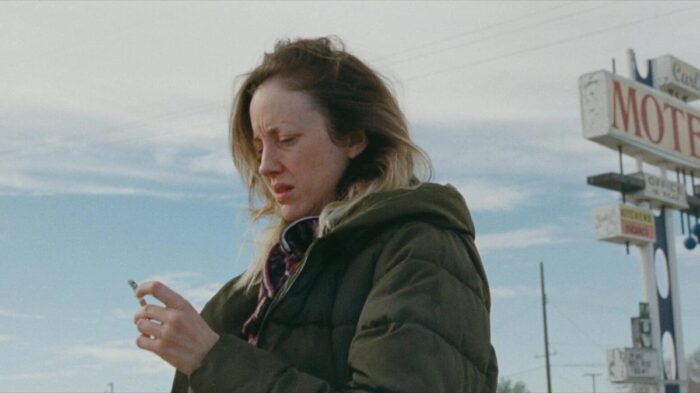Tuesday’s news that Andrea Riseborough will keep her nomination for Best Actress at the 2023 Academy Awards may not quell the controversy entirely. There still exist the questions of equity for women of color in the wake of the #OscarSoWhite movement and of how industry titans campaign for awards in ways independent filmmakers can not. Both, likely, will be continued topics throughout award season and in the future, as change is due. In the meantime, with Riseborough keeping her name among the other Best Actress nominees, more viewers are likely, at least, to seek out her powerful performance in the small indie drama To Leslie, an excellent independent film deserving of acclaim, awards hubbub notwithstanding.
The fact that few had even heard of To Leslie before its awards campaign is something of an injustice in itself. Director Michael Morris’ film had earned praise on the festival circuit, but only a meager theatrical exhibition to the tune of a paltry $27,000 in box office receipts. But even its first moments are an indication the film’s aim is true. Its title sequence (remember those?) features a plaintive Dolly Parton singing “Here I Am” over smudgy photos of protagonist Leslie (Riseborough) smiling at a prom, holding a newborn, and yes, winning the lottery. She’s a West Texas mother exuberant with glee at her winnings: 190,000 “smackeroos” a local newsman calls it while she waves around a comically large check-placard and dreams, vaguely, of “a better life.”
For some, $190,000 might indeed buy a better life of some sort. A modest house, a college education, a successful business, a secure portfolio. One of the above, anyway. But for Leslie, whose irrepressible enthusiasm all too often masks her addictive behaviors, $190,000 is nothing but a bar tab, a six-year spree of drunkenness that culminates with her eviction. Homeless and broke, she turns to her estranged son (Owen Teague of It), now 20 and making his own way as a young working man for help: their interactions—the first, obviously, in a long time—are painfully awkward as he buys her clothes and settles her into his small apartment, where he lays down the ground rules.
The first of those is “no alcohol.” But alcoholism, especially that of the sort Leslie suffers, is far stronger than any simple dictum can control. Leslie needs to drink and will drink, no matter the consequences. Soon she is homeless, again, evicted also by her former friends (and James’ former caretakers) Nancy and Dutch (Allison Janney and Stephen Root) who cannot forgive the boy’s abandonment, and out on the street once more. Any few dollars she finds are quickly spent on a cheap bottle of booze or at the local bar, where her notoriety as the local celebrity lottery winner remains even after the photos that once commemorated the event are long gone.

Desperate for shelter, Leslie sniffs around a run-down motel managed by a man named Sweeney (the perpetually exasperated Marc Maron). At first, Leslie is to him just another trespasser scavenging the grounds, but he eventually provides her a room and a job—and, slowly, just a bit of self-worth. Riseborough, obviously, is the one receiving all the acclaim and notoriety for her performance, but Maron’s is in its own way equally complex. You can see his Sweeney doubting himself but still willing to give Leslie a chance—or three—to earn her keep. As their characters grow emotionally closer, their performances, guided by Ryan Binaco’s excellent and apparently partly autobiographical script, never give way to the mawkish.

The latter half of the film uneasily, unsteadily charts Leslie’s slow, ungainly, and unrelentingly painful climb back towards sobriety and respectability. It’s not an easy path, not with her former celebrity earning her the scorn of the locals and with her own former looks and charisma having disappeared down the bottle some years back. Everyone, it seems, except Sweeney, enjoys seeing her fail, a former small-time celebrity enduring round after round of indignity and humiliation. Binaco’s script manages to turn Leslie around with Sweeney’s help in a way that seems every bit as plausible as it does just as likely to fail.
To Leslie is shot, for the most part, with a handheld camera that wobbles like Leslie’s unsteady gait and a pedestrian mise-en-scène that feels unrelentingly authentic as she traipses through bars, hotels, county fairs, and city streets. There are no special effects or gaudy techniques to call attention to themselves, just the camera and its subjects, the excellent cast giving their all in a small-stakes storyline aiming to tell a truth about a woman who won the lottery, wasted her life, and searches for a second chance.
And while everyone—including Maron and an always-game Janney—in the cast is excellent, the film is Riseborough’s masterclass. Her Leslie’s mean streak is always bubbling under the surface, ready to lash out whenever she’s caught in a lie, rejected by a lover, or desperate for a next drink. Yet somehow Riseborough also channels the exuberance and charisma a younger Leslie once possessed. In her forties, Leslie is just learning to find out who she is without alcohol, and Riseborough makes her journey one worth taking alongside her.
That To Leslie went unseen by nearly everyone during its first brief theatrical run isn’t too much of a shock. In this post- (post?) pandemic age, anything other than big-budget franchise fare is struggling to get seen. And while many will tout the Best Picture nominations of Avatar and Top Gun sequels as evidence the Academy is finally recognizing popular opinion, the fact is that smaller adult dramas like To Leslie and other independent fare will continually get squeezed out of theatrical exhibitions and awards conversations alike. That’s a shame, because anyone missing To Leslie and its star’s powerful performance is missing out on what great cinema—and great acting—can deliver.
To Leslie, directed by Michael Morris and starring Andrea Riseborough and Marc Maron, is available to purchase or rent digitally on streaming and VOD services.



